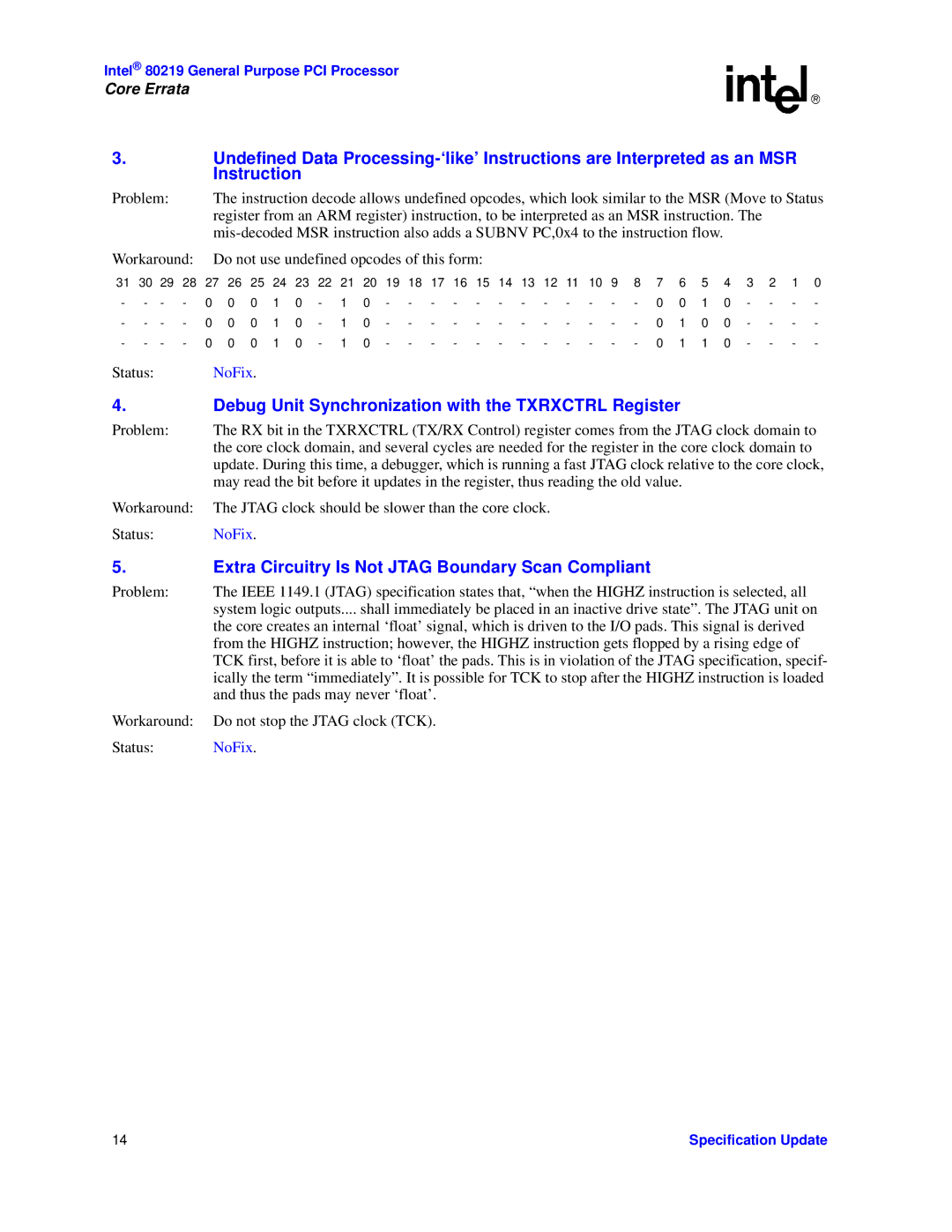Intel® 80219 General Purpose PCI Processor
Core Errata
3.Undefined Data
Problem: |
| The instruction decode allows undefined opcodes, which look similar to the MSR (Move to Status | |||||||||||||||||||||||||||||
|
|
|
| register from an ARM register) instruction, to be interpreted as an MSR instruction. The |
|
|
| ||||||||||||||||||||||||
|
|
|
|
|
|
|
|
| |||||||||||||||||||||||
Workaround: | Do not use undefined opcodes of this form: |
|
|
|
|
|
|
|
|
|
|
|
|
|
|
| |||||||||||||||
31 | 30 | 29 | 28 | 27 | 26 | 25 | 24 | 23 | 22 | 21 | 20 | 19 | 18 | 17 | 16 | 15 | 14 | 13 | 12 | 11 | 10 | 9 | 8 | 7 | 6 | 5 | 4 | 3 | 2 | 1 | 0 |
- | - | - | - | 0 | 0 | 0 | 1 | 0 | - | 1 | 0 | - | - | - | - | - | - | - | - | - | - | - | - | 0 | 0 | 1 | 0 | - | - | - | - |
- | - | - | - | 0 | 0 | 0 | 1 | 0 | - | 1 | 0 | - | - | - | - | - | - | - | - | - | - | - | - | 0 | 1 | 0 | 0 | - | - | - | - |
- | - | - | - | 0 | 0 | 0 | 1 | 0 | - | 1 | 0 | - | - | - | - | - | - | - | - | - | - | - | - | 0 | 1 | 1 | 0 | - | - | - | - |
Status: NoFix.
4.Debug Unit Synchronization with the TXRXCTRL Register
Problem: | The RX bit in the TXRXCTRL (TX/RX Control) register comes from the JTAG clock domain to |
| the core clock domain, and several cycles are needed for the register in the core clock domain to |
| update. During this time, a debugger, which is running a fast JTAG clock relative to the core clock, |
| may read the bit before it updates in the register, thus reading the old value. |
Workaround: | The JTAG clock should be slower than the core clock. |
Status: | NoFix. |
5.Extra Circuitry Is Not JTAG Boundary Scan Compliant
Problem: | The IEEE 1149.1 (JTAG) specification states that, “when the HIGHZ instruction is selected, all |
| system logic outputs.... shall immediately be placed in an inactive drive state”. The JTAG unit on |
| the core creates an internal ‘float’ signal, which is driven to the I/O pads. This signal is derived |
| from the HIGHZ instruction; however, the HIGHZ instruction gets flopped by a rising edge of |
| TCK first, before it is able to ‘float’ the pads. This is in violation of the JTAG specification, specif- |
| ically the term “immediately”. It is possible for TCK to stop after the HIGHZ instruction is loaded |
| and thus the pads may never ‘float’. |
Workaround: | Do not stop the JTAG clock (TCK). |
Status: | NoFix. |
14 | Specification Update |
